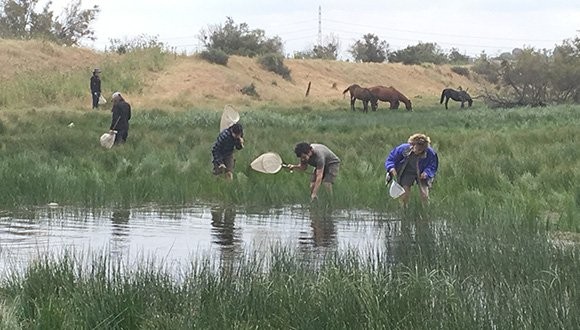B.Sc. Degree (Undergraduate Studies)
Zoology studies encompass fields such as ecology, evolution, behaviour, marine biology, nature conservation, nature-inspired technology, taxonomy and systematics, physiology and human-environment interrelations, and are part of the study track for a B.Sc. in Biology at the Faculty of Life Sciences.
Ecology is the scientific study of the interactions that determine the density and distribution of organisms in the world. Evolution is the branch of research that explains the origins of these organisms and the logic behind their structure and functioning, in light of the ecosystem in which they have developed. Together these two fields establish the broadest possible theoretical and research framework for the understanding of life on Earth.
Ecology research seeks to understand the dynamics of the populations of organisms living in their natural environment, and how processes at the level of ecology, behaviour and physiology affect this dynamics, and from there affect the structure and composition of ecological societies. Evolution research engages with an integrated perspective of all the evolutionary processes that have led to the creation of organisms, populations and ecological societies. Modern ecology and evolution research integrates advanced quantitative approaches and tools from the computer sciences, mathematics, physics and molecular biology, making ecology and evolution research increasingly relevant today, particularly in light of the global and environmental changes that are occurring across the world, as well as in light of the recognition and better understanding that the biological and behavioural mechanisms also require an understanding of the ecological and evolutionary background to their existence.
Aim of the Program
To provide a basis, together with advanced research tools, for an understanding of biology, while delving more deeply into the fields of ecology and evolutionary biology; as well as providing the necessary theoretical basis, methods of thinking and methodological tools for an understanding of the factors that influence the evolution of living organisms and the structure and dynamics of natural systems.
Study Structure
The program includes several dedicated obligatory courses in addition to the obligatory courses attended by all biology students, such as behavioural ecology, nature conservation biology and the ecology of societies and populations, as well as other new courses: biogeography, evolutionary ecology, and others to follow. Within the framework of elective courses, the program also enables access to various multidisciplinary courses connected to the field of ecology (encompassing a variety of appropriate courses, including in the Department of Earth Studies, The Faculty of Engineering, the Department of Geography and more).


